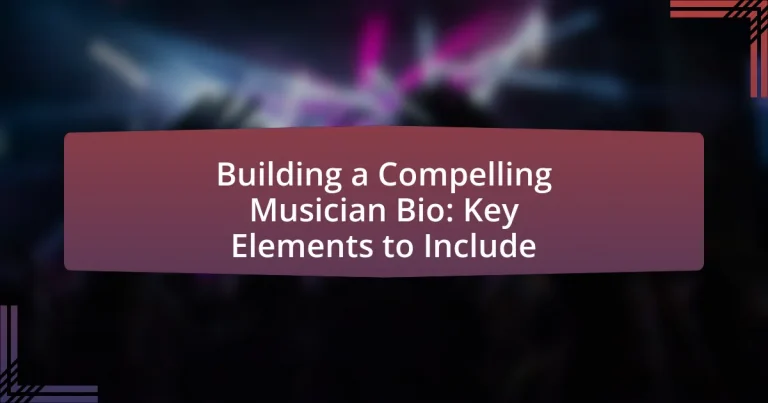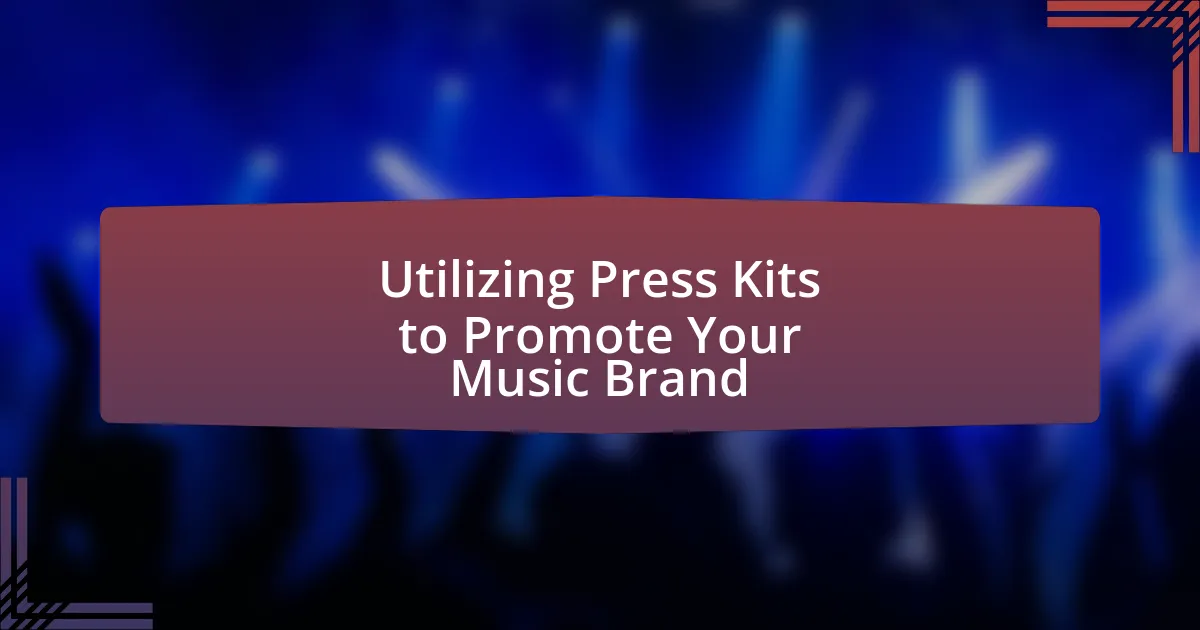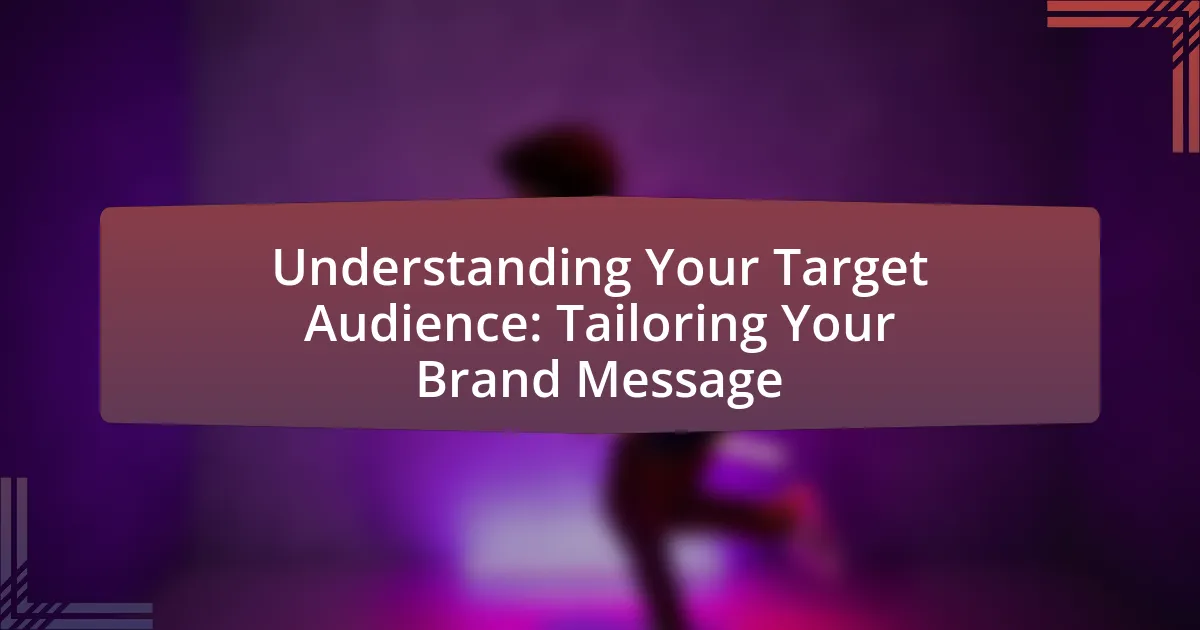The article focuses on the essential components of a compelling musician bio, emphasizing the importance of a strong opening statement, a summary of musical background, notable achievements, influences, and personal anecdotes. It highlights how personal details enhance relatability and connection with the audience, while achievements establish credibility. The article also discusses the significance of conveying musical style and future goals, as well as best practices for writing an engaging bio tailored for different platforms. Key mistakes to avoid include excessive length and vague language, ensuring that the bio remains concise and professional.
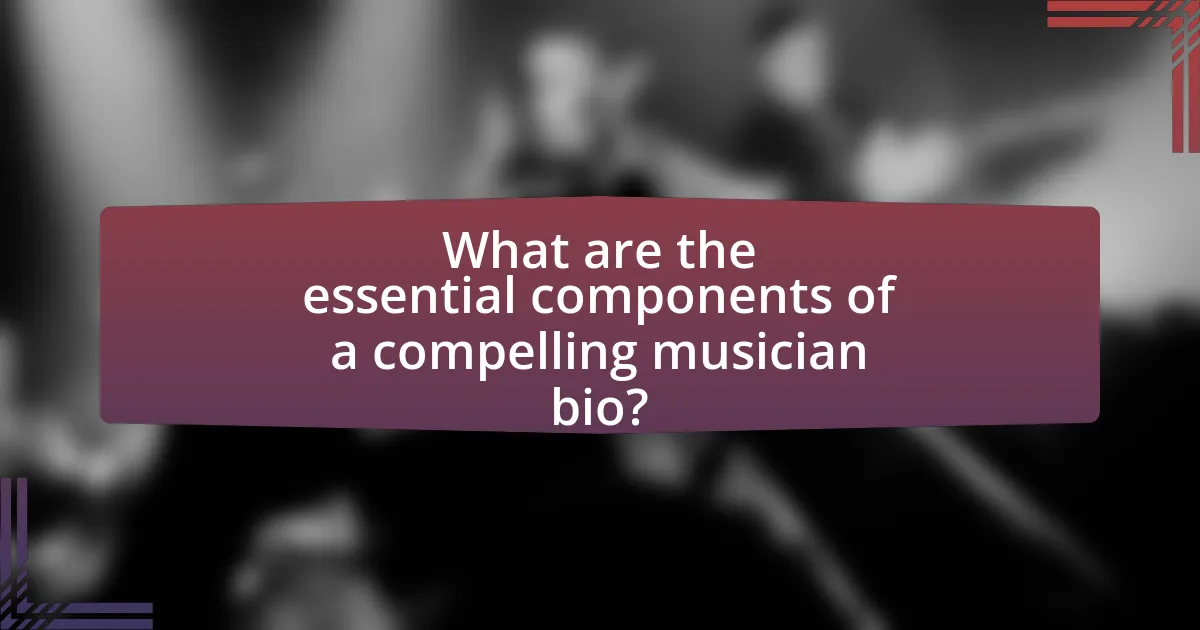
What are the essential components of a compelling musician bio?
A compelling musician bio includes essential components such as a strong opening statement, a summary of musical background, notable achievements, influences, and a personal touch. The opening statement should capture attention and convey the musician’s unique identity. A summary of musical background provides context, detailing genres, instruments, and experience. Notable achievements, such as awards or significant performances, establish credibility and highlight success. Influences offer insight into the musician’s style and artistic direction. Lastly, a personal touch, such as anecdotes or motivations, helps create a connection with the audience. These components collectively create a well-rounded and engaging bio that resonates with readers.
How do personal details enhance a musician bio?
Personal details enhance a musician bio by providing a deeper connection between the artist and their audience. These details, such as background, influences, and personal experiences, create a narrative that resonates with listeners, making the musician more relatable and memorable. For instance, sharing a musician’s journey from a small town to a major city can illustrate their dedication and passion, which can inspire fans. Additionally, personal anecdotes can highlight unique aspects of their artistry, such as cultural influences or pivotal moments that shaped their music. This enriched context not only humanizes the musician but also fosters a stronger emotional bond with the audience, ultimately enhancing their overall appeal and marketability.
What specific personal details should be included?
A compelling musician bio should include the musician’s full name, stage name, musical genre, notable achievements, and relevant background information. These details establish the musician’s identity and credibility in the industry. For instance, including awards won, significant collaborations, or chart rankings can enhance the bio’s impact. Additionally, mentioning the musician’s influences and unique style can provide context and engage the audience. This structured approach ensures that the bio effectively communicates the musician’s professional persona and artistic journey.
Why is it important to share your musical journey?
Sharing your musical journey is important because it fosters connection and authenticity with your audience. By detailing personal experiences, challenges, and milestones, musicians create a relatable narrative that resonates with listeners. This connection can enhance fan loyalty and engagement, as evidenced by studies showing that audiences are more likely to support artists who share their stories. For instance, a survey by the Music Industry Research Association found that 78% of fans feel more connected to artists who openly share their personal experiences. Thus, sharing a musical journey not only builds a compelling musician bio but also strengthens the bond between the artist and their audience.
What role do achievements play in a musician bio?
Achievements play a crucial role in a musician bio by establishing credibility and showcasing the artist’s success. They provide tangible evidence of a musician’s talent and dedication, such as awards, chart rankings, or notable collaborations. For instance, a Grammy Award or a Billboard Top 10 hit serves as a benchmark of excellence, enhancing the musician’s reputation and attracting potential fans and industry professionals. By highlighting these accomplishments, a musician bio effectively communicates the artist’s journey and significance within the music industry.
Which achievements should be highlighted?
Key achievements to highlight in a musician bio include notable awards, significant performances, and impactful collaborations. For instance, winning a Grammy Award showcases industry recognition, while performing at major festivals like Coachella or Glastonbury demonstrates a musician’s popularity and reach. Collaborating with well-known artists or producers can also indicate credibility and influence within the music community. These achievements provide concrete evidence of a musician’s talent and success, making the bio more compelling.
How can achievements be presented effectively?
Achievements can be presented effectively by using clear, quantifiable metrics and relevant context to highlight their significance. For instance, stating that a musician has performed at over 50 venues nationwide provides a concrete measure of experience, while mentioning that they received a regional award for best new artist adds credibility and context. Additionally, organizing achievements chronologically or thematically can enhance readability and impact, making it easier for audiences to grasp the musician’s journey and milestones.
Why is it important to convey your musical style?
Conveying your musical style is crucial because it helps define your identity as an artist and attracts the right audience. A clear musical style allows listeners to understand what to expect from your work, fostering a connection that can lead to a loyal fan base. For instance, artists like Taylor Swift and Ed Sheeran have successfully conveyed their distinct styles, which has contributed to their widespread recognition and commercial success. By articulating your musical style, you not only differentiate yourself in a saturated market but also enhance your branding and marketing efforts, making it easier for industry professionals to promote your music effectively.
How can you describe your musical influences?
My musical influences are diverse, encompassing genres such as rock, jazz, and classical music. These influences shape my sound and songwriting style, as I draw inspiration from iconic artists like Jimi Hendrix for guitar techniques, Miles Davis for improvisation, and Beethoven for compositional structure. This blend of influences allows me to create a unique musical identity that resonates with a wide audience.
What language should be used to reflect your style?
The language used to reflect your style should be authentic and aligned with your musical genre. For instance, if you are a hip-hop artist, incorporating slang and rhythmic phrasing can resonate with your audience, while a classical musician might opt for more formal and sophisticated language. This approach ensures that your bio not only communicates your identity but also connects with listeners who appreciate your specific style.
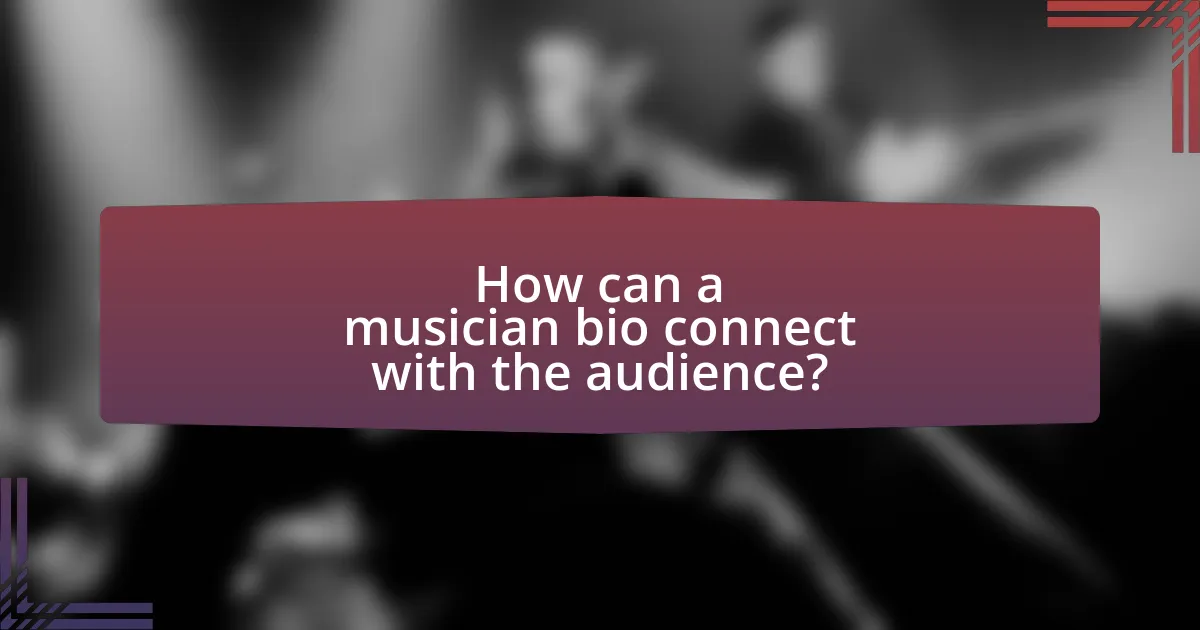
How can a musician bio connect with the audience?
A musician bio can connect with the audience by conveying authenticity and relatability through personal stories and experiences. When musicians share their journey, struggles, and inspirations, it creates an emotional bond with listeners, making them feel more invested in the artist’s music. For instance, a bio that includes specific anecdotes about how a musician overcame challenges or what motivated them to pursue music can resonate deeply with fans. Research indicates that storytelling in bios enhances audience engagement, as it allows listeners to see themselves in the artist’s narrative, fostering a sense of community and connection.
What storytelling techniques can be used in a musician bio?
Storytelling techniques that can be used in a musician bio include narrative structure, personal anecdotes, and vivid imagery. Narrative structure allows the bio to unfold like a story, engaging the reader by presenting the musician’s journey chronologically or thematically. Personal anecdotes provide authenticity and relatability, showcasing unique experiences that shaped the musician’s artistry. Vivid imagery enhances the emotional connection, painting a picture of the musician’s influences, performances, and creative process. These techniques collectively create a compelling narrative that resonates with audiences, making the musician’s bio memorable and impactful.
How can anecdotes enhance relatability?
Anecdotes enhance relatability by providing personal stories that resonate with audiences, making the subject more approachable and human. When musicians share specific experiences, such as overcoming challenges or memorable moments in their careers, they create emotional connections with listeners. Research indicates that storytelling can activate the brain’s mirror neurons, which help individuals empathize with the storyteller’s emotions, thereby increasing relatability. This connection is crucial in a musician’s bio, as it allows fans to see the artist as more than just a performer, fostering loyalty and engagement.
What is the impact of emotional connection in storytelling?
Emotional connection in storytelling significantly enhances audience engagement and retention. When stories evoke emotions, they create a bond between the storyteller and the audience, leading to a deeper understanding and appreciation of the narrative. Research indicates that emotionally charged stories are more memorable; for instance, a study published in the journal “Cognitive Science” found that emotional content increases memory retention by up to 70%. This impact is crucial for musicians crafting their bios, as a compelling narrative can resonate with listeners, fostering loyalty and connection to the artist’s work.
Why is it important to include future goals in a musician bio?
Including future goals in a musician bio is important because it provides insight into the artist’s aspirations and direction, which can engage fans and industry professionals. By articulating specific objectives, such as upcoming projects or desired collaborations, musicians can demonstrate ambition and a proactive approach to their careers. This transparency can foster a deeper connection with audiences, as fans often appreciate knowing what to expect next and how they can support the artist’s journey. Furthermore, industry stakeholders, such as record labels and promoters, may view clear future goals as a sign of professionalism and commitment, potentially leading to more opportunities for the musician.
How can future aspirations inspire your audience?
Future aspirations can inspire your audience by providing a vision of what is possible and motivating them to pursue their own goals. When musicians articulate their dreams and ambitions, they create a relatable narrative that resonates with listeners, encouraging them to reflect on their own aspirations. Research shows that storytelling, particularly about future goals, can enhance emotional engagement and foster a sense of connection, as evidenced by studies in psychology that highlight the impact of aspirational narratives on audience motivation. By sharing specific future aspirations, musicians can effectively galvanize their audience, making them feel part of a shared journey toward success.
What goals should be mentioned to engage listeners?
To engage listeners, musicians should mention goals such as creating emotional connections, showcasing unique artistry, and building a loyal fanbase. Emotional connections can be established by sharing personal stories or experiences that resonate with the audience, making the music more relatable. Showcasing unique artistry involves highlighting distinctive musical styles or influences that set the musician apart, which can intrigue listeners and draw them in. Building a loyal fanbase is crucial for long-term success; this can be achieved by emphasizing goals related to community engagement, such as hosting events or interacting with fans on social media platforms. These goals are essential for fostering a deeper relationship with listeners and enhancing overall engagement.

What are the best practices for writing a musician bio?
The best practices for writing a musician bio include being concise, highlighting key achievements, and showcasing personal style. A concise bio, typically around 150-300 words, ensures that readers remain engaged. Highlighting key achievements, such as notable performances, awards, or collaborations, provides credibility and context, making the musician’s experience clear. Showcasing personal style through unique anecdotes or influences helps to create a connection with the audience. According to a survey by Sonicbids, 70% of industry professionals prefer bios that are straightforward and informative, underscoring the importance of clarity and relevance in musician bios.
How can you tailor your bio for different platforms?
To tailor your bio for different platforms, focus on the specific audience and format of each platform. For example, on Instagram, use a concise and visually engaging style, highlighting key achievements and personal touches, while on LinkedIn, adopt a professional tone that emphasizes your experience and skills in the music industry. Research shows that bios tailored to platform-specific audiences increase engagement; a study by Buffer found that personalized content can boost interaction rates by up to 60%.
What should be considered when writing for social media?
When writing for social media, clarity and engagement are essential. Clear messaging ensures that the audience quickly understands the content, while engaging language encourages interaction and sharing. According to a study by BuzzSumo, posts with clear, concise language receive 50% more engagement than those that are overly complex. Additionally, incorporating visuals can enhance the message, as posts with images are known to generate 650% higher engagement than text-only posts. Therefore, focusing on clarity, engagement, and visual elements is crucial for effective social media writing.
How does a bio differ for press kits versus personal websites?
A bio for press kits differs from a bio for personal websites primarily in its purpose and audience. Press kit bios are concise, focused on professional achievements, and tailored for media use, emphasizing key accomplishments and relevant information that journalists need to create stories. In contrast, personal website bios are often more detailed and personal, allowing for a narrative that includes the artist’s journey, influences, and personality, catering directly to fans and potential collaborators. This distinction is crucial as press kits aim to facilitate media coverage, while personal websites seek to engage and connect with the audience on a deeper level.
What common mistakes should be avoided in a musician bio?
Common mistakes to avoid in a musician bio include excessive length, lack of focus, and vague language. A musician bio should be concise, ideally between 150 to 300 words, to maintain the reader’s interest. Failing to highlight unique achievements or specific genres can lead to a generic portrayal, diminishing the artist’s individuality. Additionally, using jargon or overly complex language can alienate potential fans and industry professionals. Clear, engaging storytelling that emphasizes key milestones and personal influences is essential for creating a compelling narrative.
How can you ensure your bio remains concise and impactful?
To ensure your bio remains concise and impactful, focus on key achievements and unique qualities that define your musical identity. Highlight specific accomplishments, such as notable performances or awards, while using clear and direct language to convey your message. For instance, a musician might state, “I have performed at major festivals like Coachella and received a Grammy nomination,” which provides concrete evidence of success and relevance. By prioritizing essential information and avoiding unnecessary details, you create a bio that captures attention and communicates your artistic essence effectively.
What pitfalls should be avoided to maintain professionalism?
To maintain professionalism, musicians should avoid pitfalls such as using informal language, oversharing personal information, and neglecting proper formatting. Informal language can undermine credibility, while oversharing can create discomfort and detract from the professional image. Proper formatting ensures clarity and readability, which are essential for making a strong impression. According to a study by the National Endowment for the Arts, professionalism in presentation significantly influences audience perception and engagement, highlighting the importance of these factors in a musician’s bio.
What tips can help create an engaging musician bio?
To create an engaging musician bio, focus on authenticity, storytelling, and key achievements. Authenticity ensures that the bio reflects the musician’s true personality and style, which resonates with audiences. Storytelling allows the musician to share their journey, influences, and experiences, making the bio relatable and memorable. Highlighting key achievements, such as awards, notable performances, or collaborations, adds credibility and showcases the musician’s talent. According to a study by the University of Southern California, personal narratives in bios significantly increase audience engagement, demonstrating the effectiveness of these strategies.
